7 Vegetables That Reduce Inflammation and Slow Aging – Inflammation can be a confusing topic to discuss. Your body uses inflammation when you suffer an injury or sickness because it’s how it heals itself! However, more and more people these days are suffering from chronic inflammation, which is an entirely different story. Inflammation turns chronic when your body continues to send out inflammatory markers even when you don’t have a specific injury. This can happen because of a number of factors, such as autoimmune disorders, excess alcohol consumption, stress, and smoking. Over time, having chronic inflammation can lead to serious health conditions like arthritis, heart disease, diabetes, Alzheimer’s, and even certain types of cancer.
This type of chronic inflammation is closely related to the aging process, as well. A report published in Aging and Disease says inflammation that is left untreated can ultimately accelerate the aging process and increase the risk of age-related illness. So, fighting inflammation also means helping to slow aging, as well. Preventing chronic inflammation involves eating a healthy diet and avoiding a sedentary lifestyle. While we can’t avoid inflammation by just eating one type of food, there are certain nutrient-dense foods, like vegetables, we can incorporate into our diet to help.
With this in mind, we asked dietitians about which vegetables were best to eat to reduce inflammation and slow aging. Continue reading to learn what they have to say—healthy eating tips, check out What Science Says About Eating Habits That Slow Aging.
Whether they’re raw or cooked, carrots pack a punch of nutrients, some of which may help to fight inflammation.
“Carrots are packed with beta-carotene, a carotenoid that the body uses to form vitamin A, and vitamin A can support bone health and skin health, especially as we age,” says Lauren Manaker, MS, RDN, registered dietitian and author of The First Time Mom’s Pregnancy Cookbook and Fueling Male Fertility. “Vitamin A has also been shown to have anti inflammatory benefits.”
According to the Journal of Functional Foods, carrots can reduce inflammation and oxidative stress in the body, which can lead to strengthening of the immune system as well.
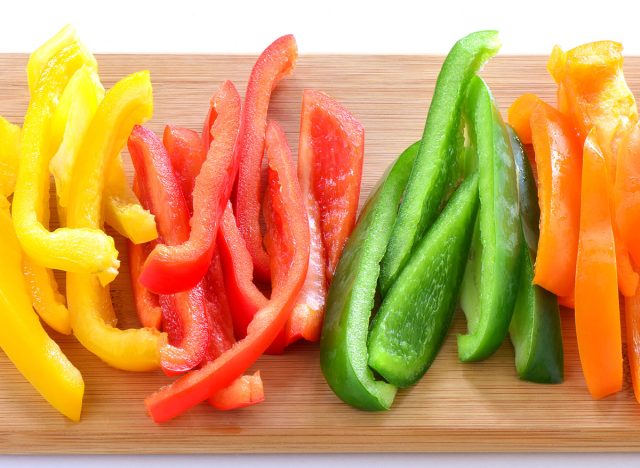
Bell peppers are a versatile vegetable that can be enjoyed cooked or eaten raw with your favorite dip. And according to our dietitians, they’re helpful for managing inflammation to slow aging, too.
“Bell peppers are high in vitamin C and vitamin A, which are naturally occurring antioxidants. They are also high in fiber and water, making them a hydrating veggie. Their high levels of antioxidants also make them anti-inflammatory, which means they can help reduce inflammation in the body,” says Dana Ellis Hunnes, PhD, MPH, RD, a registered dietitian and author of Recipe for Survival.
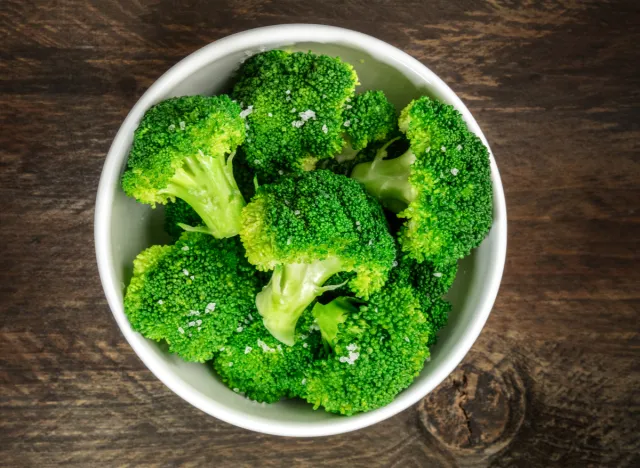
Another extremely nutrient-dense veggie option, so you may want to add broccoli to your next dinner to slow the rate of age-related diseases that are linked to chronic inflammation.
One study published in Clinical Nutrition found that broccoli sprouts were able to decrease inflammatory markers, such as C-reactive proteins.
“Broccoli is high sulfurophanes, which are naturally occurring antioxidants that are extremely healthy and anti-inflammatory. Broccoli is also high in calcium, fiber, and contains a fair amount of water, which also contributes to its anti-inflammatory abilities. It also has a lot of plant-based protein in it compared to other vegetables,” says Hunnes.
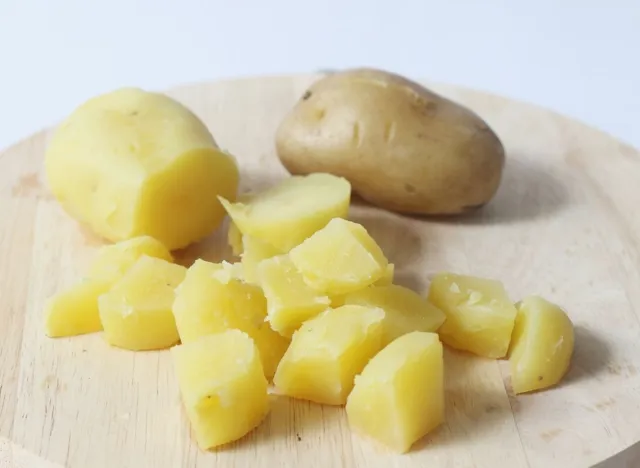
People have mixed opinions about potatoes because they are a carb-heavy vegetable, but this root vegetable is packed full of helpful nutrients that can slow aging.
“Potatoes are a nutrient-rich food that are rich in fiber, potassium, vitamin C, and can fight against free radicals. White potatoes can lower inflammation, cholesterol, and blood pressure in the body,” says registered dietitian Veronica Rouse, MAN, RD, CDE.
Looking at some of these nutrients found in potatoes, potassium specifically has been found to help reduce inflammation and pain, especially in those with rheumatoid arthritis. Higher levels of dietary fiber has been linked to lower inflammation in the body as well.
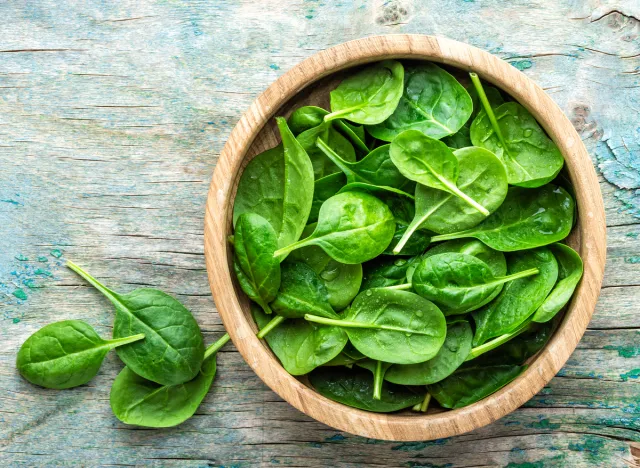
If you’re looking for a delicious salad or something to easily add to most types of cuisines, leafy greens are an important vegetable for inflammation that you can go to whenever you’re in need of a health boost.
“Leafy greens such as spinach, kale, arugula, romaine lettuce, and Swiss chard, are excellent sources of many vitamins, minerals, and antioxidants. They provide the body with Vitamins A, C, E, and K, iron, potassium, calcium, magnesium, and fiber. Including dark green leafy vegetables in your diet can help reduce inflammation in the body and support overall health,” says registered dietitian Mandy Tyler, MEd, RD, CSSD, LD, LAT.
According to Harvard Health, leafy greens are listed as helpful anti-inflammatory foods because of their high levels of antioxidants and polyphenols.
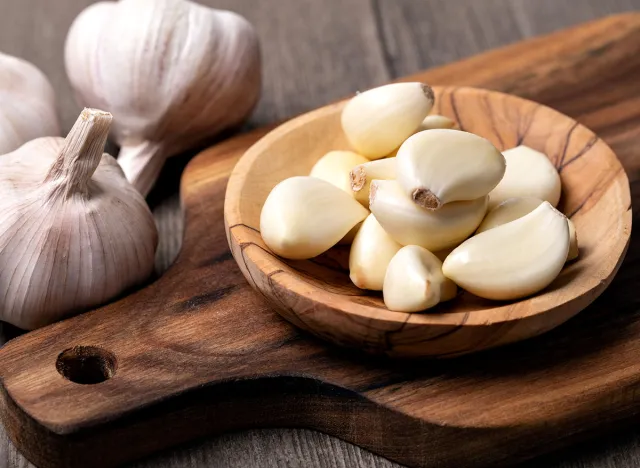
Garlic is not only delicious and full of flavor, but it has plenty of helpful benefits for many different aspects of your health—including helping to reduce inflammation.
According to the Journal of Medicinal Food, garlic is made up of sulfur-containing compounds that provide anti-inflammatory benefits. In fact, a report published in Anti-Cancer Agents in Medicinal Chemistry concluded that these organosulfur compounds may even be beneficial in helping to boost your immune system and help to prevent certain cancerous tumor growth.
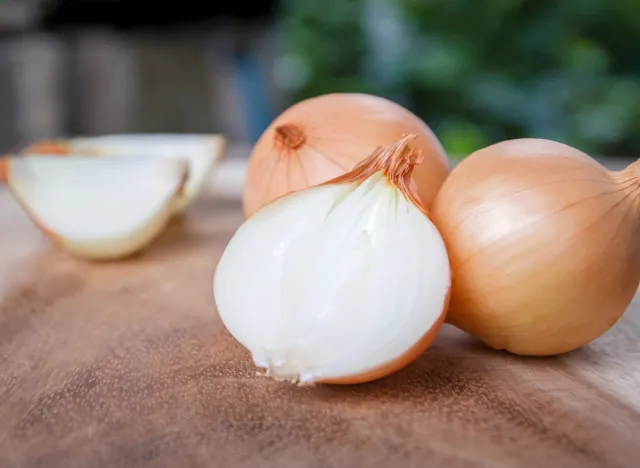
Along with garlic, onions can also add a burst of flavor to your favorite dishes, as well as a burst of helpful anti-inflammatory nutrients, too!
For one, onions are a good source of potassium, which, as we mentioned above, has been found to help reduce inflammation. This vegetable is also rich in an antioxidant called quercetin. According to Nutrients, quercetin may have beneficial properties for your immunity and reduction of inflammatory markers, and another report from Frontiers in Immunology found that its anti-inflammatory effects may be helpful in reducing symptoms of certain autoimmune disorders.
After learning this information about the best vegetables for inflammation and slowing aging, we hope you can find a few you enjoy and can add to your next meal.
A previous version of this story was published on July 20, 2022. It has been updated to include additional copy and proofreading revisions, additional research, and updated contextual links.

